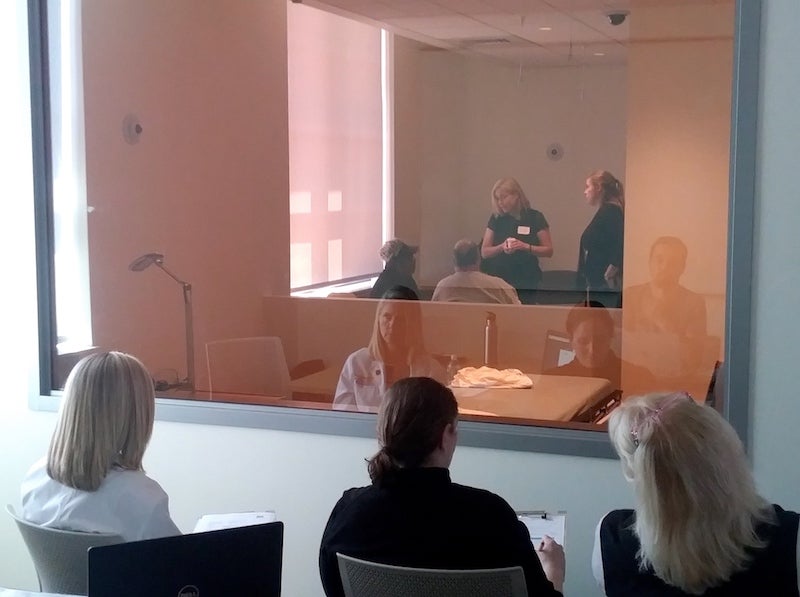Nurse practitioner students get advanced simulated training in an emerging health trend
As the costs associated with health care continue to soar, there is a greater emphasis in the industry on keeping people out of hospitals and receiving more care in the home, opening new opportunities and new responsibilities for health care workers.
Nurse practitioner students at the University of Rhode Island will have a head start on preparing for the changing role of home health care workers, thanks to a $159,000 grant from the state Executive Office of Health and Human Services, part of the Healthcare Workforce Transformation project. The students in the URI College of Nursing are getting specific instruction on the unique challenges of home health care in the advanced simulation labs at the Rhode Island Nursing Education Center. They will then apply those skills directly, according to URI College of Nursing Graduate School Associate Dean Denise Coppa.
“These students will be prepared to deliver primary care in the home for a medically underserved population,” Coppa said, noting 30 URI students in 2018 are expected to be educated through two simulated experiences, compared to just eight students last year who were educated and placed with a nurse practitioner clinical faculty member delivering home-based care in the community. “A very important part of the role of a nurse practitioner is health promotion and prevention, a lot of which will be done in the home. The value of this program is showing our students that they see patients differently in home-based care.”
The program employs Simpl Simulation, a company that specializes in simulated clinical experiences for nursing students, which spent two days recently running nursing students through a simulated home care experience, utilizing live actors. The actors portrayed married couple George and Reid, two men in their mid-60s, one of whom has just been discharged from the hospital after undergoing a hip replacement. In the simulation, the students are serving as nurse practitioners making the first house call on George three days after his release.
The students visit with the couple in a simulated home in the lab, which is designed to resemble a typical four-room apartment, complete with living room, bedroom, kitchen and bathroom. The lab contains all the furniture, appliances and even clutter you would expect to find in a typical home to create as realistic a scenario as possible. The students are able to practice treating the patient and interviewing both him and his husband to learn the challenges they have in George’s treatment and in their lives.
Meanwhile, evaluators observe the interaction through one-way glass while the students’ interactions with the “patients” are recorded for debriefing afterward, giving the students real-life practice and immediate feedback on their work from observers and even the actors themselves.
“This provides students the opportunity to have a hands-on experience where it’s safe to make mistakes before they work with actual patients,” said Tonya Schneidereith, managing partner of Simpl Simulation. “It’s reflective learning; they can think about things they did right, and maybe things they didn’t do correctly, and correct that behavior. In a classroom, students are taught from a lecture and are expected to be able to apply it in a health care setting. This gives them an opportunity to actually apply it before practicing on a live patient.”
That experience is invaluable for a student to be prepared for facing real-life home health care situations, according to nurse practitioner graduate student Kristen Rameika.
“Home-based care is seen more and more these days due to insurance reasons. Patients are being discharged from the hospital sooner and resuming their care in the comfort of their own home,” Rameika said. “Home-based care is an important topic to touch on and train for in graduate school. I believe the simulation training helped prepare us for barriers we will be facing when we graduate from the program as advanced practice nurses.”
The health care industry in general is transitioning to a more home-based approach as hospital costs continue to skyrocket, Coppa said. Providing primary care in residential settings can help keep people who don’t necessarily need to be in a hospital in a more comfortable environment that also helps save money.
“Home-based care is saving millions, just by helping keep people out of emergency rooms when they don’t need to be there. There is a dramatic decrease in costs,” Coppa said, noting health care workers trained in home care are increasingly in demand. “There are nurse practitioners who specialize in home-based care. So many of our students are going to be asked to do some form of home-based primary health care after they graduate.”

